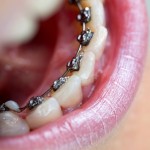
Following orthodontic treatment a period of retention is needed is maintain the teeth in their new position. A lower fixed retainer bonded to the anterior teeth is a commonly used type of retainer being bonded either to all six anterior teeth or lower canines only.
The aim of this review was to evaluate the difference in stability between lower fixed retainers bonded on all six anterior teeth (lower incisors and canines) and those bonded only to the canines.
Methods
Searches were conducted in the PubMed, Scopus, Web of Science, Cochrane Library, Lilacs, OpenGrey, ClinicalTrials, and Google Scholar databases with no restrictions on date or language. Prospective and retrospective studies conducted in adults and adolescents comparing lower fixed retainers bonded only on canines to retainers bonded to all anterior teeth (lower incisors and canines), were considered. Study selection, data extraction and risk of bias assessment was conducted independently by two reviewers. The Cochrane risk of bias tool was used to assess randomised controlled trials (RCTs) with nonrandomised studies (NRS) being assessed with the Risk of Bias in Non-randomized Studies of Interventions (ROBINS-I) tool.
Results
- 5 studies (2 RCTs, 3 NRS) involving a total of 333 patients were included.
- Studies were conducted in Germany, Jordan, Norway, Sweden and the USA.
- Follow up times ranged from 1 to 9 years.
- One RCT was considered to be at high risk of bias and one at low risk of bias.
- Two of the NRS studies were considered to be at low risk of bias 1 at serious risk of bias.
- 2 studies (1 RCT,1 NRS) reported better stability for the retainer bonded on all lower anterior teeth.
- 3 studies (1 RCT,2 NRS) showed no differences between the two types of retainers in breakage frequency or stability of treatment.
Conclusions
The authors concluded: –
The current evidence may point to better stability of dental alignment when lower fixed orthodontic retainers are bonded to all anterior teeth. However, as uncertainty is moderate, more reliable research on the topic is needed to clarify some of the contradictions among the studies included.
Comments
A 2016 Cochrane review by Littlewood et al (Dental Elf – 1st Feb 2016) investigated different retention strategies finding insufficient high-quality evidence to make recommendations on retention procedures. This new systematic review addresses a very specific question about bonding strategies for lower retainers. The authors have undertaken an extensive data source only identifying 5 studies only two of which are RCTs. Two of the 5 studies reported better stability when all the lower anterior teeth were bonded. However, one of the 2 RCTs was considered to be at high risk of bias and there was significant variation in the follow up periods between the studies. GRADE was used to assess the certainty of the evidence but given that risk of bias in one of the RCTs the relatively small size of the studies and that fact that the majority of included studies were non-randomised grading of two of the outcomes as moderate certainty seems generous. Further high quality well conducted and reported trials of appropriate size and follow up would be needed to address this question.
Links
Primary Paper
Moda LB, da Silva Barros ALC, Fagundes NCF, Normando D, Maia LC, Mendes SMDA. Lower fixed retainers: bonded on all teeth or only on canines? A systematic review. Angle Orthod. 2019 Sep 19. doi: 10.2319/013019-63.1. [Epub ahead of print] PubMed PMID: 31536378.
Other references
Dental Elf – 1st Feb 2016
Orthodontic retention – little high quality evidence to recommend any one approach to over another
